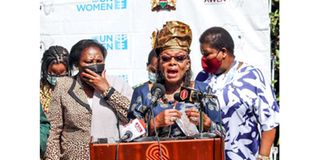Let’s say no to intimidation of female aspirants

African Women Leaders Network chairperson Jennifer Riria (speaking), co-chairperson Rahab Muyu (left) and Kenya Women Traders Association CEO Benter Opande in Nairobi, last month. They cautioned politicians against using inflammatory language and hate speech.
What you need to know:
- Female politicians must speak out in support of any of them attacked in any manner because of their gender.
- Any form of attacks, threats and violence against women are meant to force them out of electoral competitions.
As the countdown to the August 9 polls continues, indications are clear that it will not only be highly competitive, but also heated up.
If the use of language at the political field is anything to go by, the media and the National Cohesion and Integration Commission have their jobs cut out for them. Thankfully, the media recognises the importance of general elections and its critical role of enabling a free, fair, credible, transparent and democratic process.
For this reason, the Media Council of Kenya, in partnership with media houses and other associations, put together comprehensive guiding principles in the coverage of the upcoming election.
In the Guidelines for Election Coverage 2021, media practitioners, owners and managers, expressed the determination to help the voter make informed choices, committed to adopting and abiding by the guidelines, which reflect the tenets of the Code of Conduct for the Practice of Journalism in Kenya, the Constitution and related laws.
Should journalists covering the election abide by the dictates of the guidelines, then coverage of women aspirants and indeed of all candidates – will be objective, fair and accurate.
In addition, their coverage (especially during campaigns) will not contain any obscenity, offensiveness, and tasteless language that is all too commonly hurled at women candidates, mostly by male rivals and allies.
Public interest
While political actors are public figures whose lives become of interest to the people they seek to represent, there is a limit to how much media practitioners can encroach on their private lives.
The new guidelines advise journalists covering elections to not intrude into a political actor’s private life without their consent, unless public interest is involved. This particular rule is significant.
Potential female politicians have been known to abandon their political bid out of fear of having their private lives and that of their families, exposed.
This – in addition to the fear of violence, verbal and physical attacks, in many cases by goons hired by rivals aimed at the female candidates and their families – has been known to be one of the key hurdles to women’s participation in elections. It is a challenge that women aspirants often highlight in related training and workshops.
The guidelines for elections coverage are also broad on gender-sensitive reporting and the requirement to incorporate interests of all, irrespective of gender in the electoral process.
Dealing with journalists
The failure to observe this rule in the general election would mean continued perpetuation of limitations, obstructions and impediments to a fair and level field in elections, with women and people with disabilities on the receiving end.
It is important that women aspirants access this guide, which, although meant for journalists, is a helpful source of information since dealing with journalists while at it, will be inevitable.
Getting to know how to deal with the media and other stakeholders in the electoral process for women aspirants, is as crucial as it is for the same to support each other in the face of harassment and any other form of abuse directed at them because of their gender.
Any form of threats and violence against women gunning for seats in elections is usually aimed at intimidating them off the competition.
As such, women politicians must take it upon themselves to speak out in support of any of them attacked because of their gender.
Any form of gender-based violence (GBV) and unacceptable behaviour by mostly male political rivals, is unacceptable and women candidates need to make this clear.
In the matters of GBV and bias in politics – all so common during campaigns – women from all sides of the political divide, need to close ranks and address such attacks, as they say no to intimidation. This is important as part of raising awareness of discrimination, stigmatisation, violations and violence against women in politics.
This struggle for clean politics and fairness in elections must go beyond political party loyalty.
Ms Rugene, a former Nation parliamentary editor, is founder, The Woman’s Newsroom Foundation, and consulting editor.





